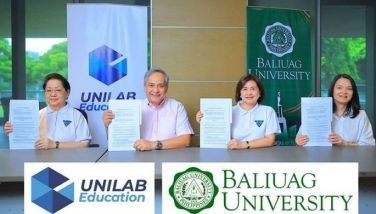Under the Volcano
(Part 1)
I was at the Fontana resort complex at the Clark Freeport Zone in Pampanga last week for the fourth edition of what’s become an annual gathering of writers from all over the archipelago. Called Taboan, from the Visayan word for “marketplace,” this three-day festival sponsored by the National Commission for Culture and the Arts (NCCA) has become an annual highlight of the Filipino writer’s literary calendar, moving around the country from Manila to Cebu and Davao and now Pampanga. This year, its focus was “History and Literature,” with one of its most compelling subtopics being “Literature Under the Volcano,” a reference to Mt. Pinatubo and to the metaphorical social volcano that Central Luzon has been for centuries.
With each Taboan, we want to bring more writers, especially from the regions, into the national writing community, to dispel the notion that the only interesting and significant writing comes from Manila, or comes only in English or Filipino. This is an integral task of nationbuilding, this sharing and weaving of not only individual works but of the Filipino imagination, of how we see and represent ourselves as members of the same large family. Taboan is also a rare opportunity to broaden and deepen the personal friendships among writers that ultimately lead to a better understanding of what the other’s labors are all about.
This time around, for example, I was happily billeted with three fellow members of the NCCA’s National Committee for Literary Arts who are also among the most talented and active writers of the regions they represent: Carlos “Carlo” Arejola of Bicol, Harold Mercurio of Eastern Visayas, and Fr. Albert Alejo of Western Mindanao. Curious to find out what was going on with literature in his region, I had a chat with Carlo over breakfast, during which he eagerly reported on the recent resurgence of writing in Bikol (“Bikol” with a k refers to the language; with a c, it means the place).
“Bikol is a highly variegated language with Bikol Naga and Bikol Legaspi predominating, and many more dialects and variants to be found across the region. We often say here that once you cross the river, you’ll be speaking another kind of Bikol,” Carlo told me. “Bikol Naga became the lingua franca by default, because of its use in church.”
Writing in Bikol — under another volcano, come to think of it — has been undergoing a revival these past two decades, thanks to the efforts of advocates, academics, and a new generation of young, largely multilingual writers who have found pride in their roots and, in it, an opportunity to bring the language into the 21st century.
Bicol has had a long and glorious literary tradition, both in its own language and in English and Filipino as well. In Spanish times, devotional poetry was matched by protest drama; the comedia was very popular, as was the rawitdawit, a narrative poem. More recently, the names most closely associated with new writing from Bicol have included Rudy Alano, Carlos Aureus, Abdon “Jun” Balde, Jr., Raffi Banzuela, Rafael Belgica, Jr., Jose Jason Chancoco, Frank Peñones, Marne Kilates, and Alvin Yapan, among others. Abroad, Luis Cabalquinto in the US and Merlinda Bobis in Australia have led the Bicolano literary diaspora.
A playwright and poet, Carlo himself belongs to a family rooted in literature and committed to its advancement. His great-granduncle Tomas was a propagandist and legislator, in whose honor Carlo’s family has sponsored the annual Premio Tomas Arejola para sa Literaturang Bikolnon, the region’s most prestigious literary competition, now on its ninth year, as well as a creative writing workshop, the Juliana Arejola-Fajardo Workshop sa Pagsurat Bikol. (You can check out the rules for this year’s contest and workshop at www. panitikan.com.ph.)
The Premio Tomas Arejola and the Juliana Pagsurat Bikol Workshop will also be re-launched at the 2012 Pintakasi kan Literaturang Bikolnon (Bikol Literature Festival) on February 16 and 17 in Pili, Camarines Sur. The Sangguniang Bayan of Pili declared February 6 Aldaw kan mga Parasurat kan Kabikolan (Bicol Writers’ Day) and February 7 Aldaw kan mga Librong Bikol (Bikol Books Day). Naga City has set up an NCCA desk, inaugurated last August 5 in conjunction with Raul Roco Day, to undertake literary development programs.
Not surprisingly, aside from local governments, schools have been vital in the effort to revive Bikol literature, says Carlo—not just the major universities such as the Ateneo de Naga and the University of Nueva Caceres, but even smaller, newer institutions such as the Naga College Foundation. Ateneo de Naga has opened a university press that recently came out with two new books of translations undertaken by two of the region’s brightest young writers: Rainer Maria Rilke by Kristian Cordero and John Donne by Vic Nierva. It was at Ateneo de Naga that, in the 1980s, a young and progressive teacher named Paz Verdades Santos—or “Doods” as we call her, the wife of activist-lawyer and now Naga judge Soliman Santos, Jr.—began teaching Bikol literature in her English class. At that same time, scholar and professor Dr. Lilia Realubit was undertaking pioneering studies in Bikol literature in our department in UP Diliman.
And then, of course, there’s the Internet, which has made publishing new works much easier, especially from new young authors.
Next week, I’ll have more to report on the goings-on at Taboan and of some wonderful discoveries we made in Pampanga.
Meanwhile, on behalf of the Taboan 2012 Steering Committee headed by the Festival Director, Dr. Juliet Mallari, I’d like to thank our major sponsors for their support—the Systems Plus College Foundation, the Clark Development Foundation, the Province of Pampanga, and Angeles City, with a special mention of fellow Beatles fan Angeles City Mayor Edgardo D. Pamintuan, a budding journalist before shifting to Political Science at UST, who went out of his way to make our visit to his city a truly memorable one.
* * *
And finally, I better make this plug lest I get tossed out of the marital bed. My watercolorist-and-art-conservator wife June, aka Beng, has been very actively involved in the UP College of Fine Arts Alumni Foundation, which is spearheading ARTBEAT, a one-week art celebration that aims to raise funds for the different needs of the students, faculty and the college itself, culminating in an alumni homecoming on February 25.
Despite having produced several National Artists and excellent graduates, the college continues to be in need of help in many areas. Of special concern to the foundation and to CFA Dean Tina Colayco are the college’s very talented but poorest students, some of whom drop out because they can’t even afford to pay for lunch and transportation, not to mention art materials, despite UP’s socialized tuition scheme.
The following ARTBEAT activities will be held at the UP Executive House on F. Maramag St. Area 14, UP Campus, Diliman, QC:
Feb. 20-25: An exhibit of donated artworks (paintings, drawings, watercolors, photographs, sculptures and prints);
Feb. 21-24: Sketching sessions and landscape painting and drawing; and
Feb. 25: Alumni homecoming, 4:00 pm.
The participating artists will include, among many others, Bencab, Junyee, Rock Drilon, Alfredo Liongoren, Manny Garibay, Gig de Pio, Romy Carlos, Jeff Dizon, Hugo Yonzon, Paul Quiano, Cheloy Dans, Meps Cajipe, Ofelia Gelvezon, June Dalisay, Gloria Tenza-Lava, Janice Young, Tess Duldulao, Sajid Imao, Cris Cruz, Ben Infante, Jonah Salvosa, Vincent de Pio , Ben Infante, Don Artificio, Ric de Villa, Aileen Lanuza, Sinkin de Pio, Ding Hidalgo, Horace Gillego, Randy Solon, Pete Jimenez, Cee Cadid, Grandier Bella, Neil Doloricon, Bim Bacaltos, Julius Torres, Dennis Balbaboko, Norly Maimban, and Angel Cacnio.
For more information, please contact Tess Camacho at 928-8648, Menchu Pascual at 0917-7920448, or June Dalisay at 0917-8563972.
* * *
E-mail me at penmanila@yahoo.com and check out my blog at www.penmanila.ph.




















